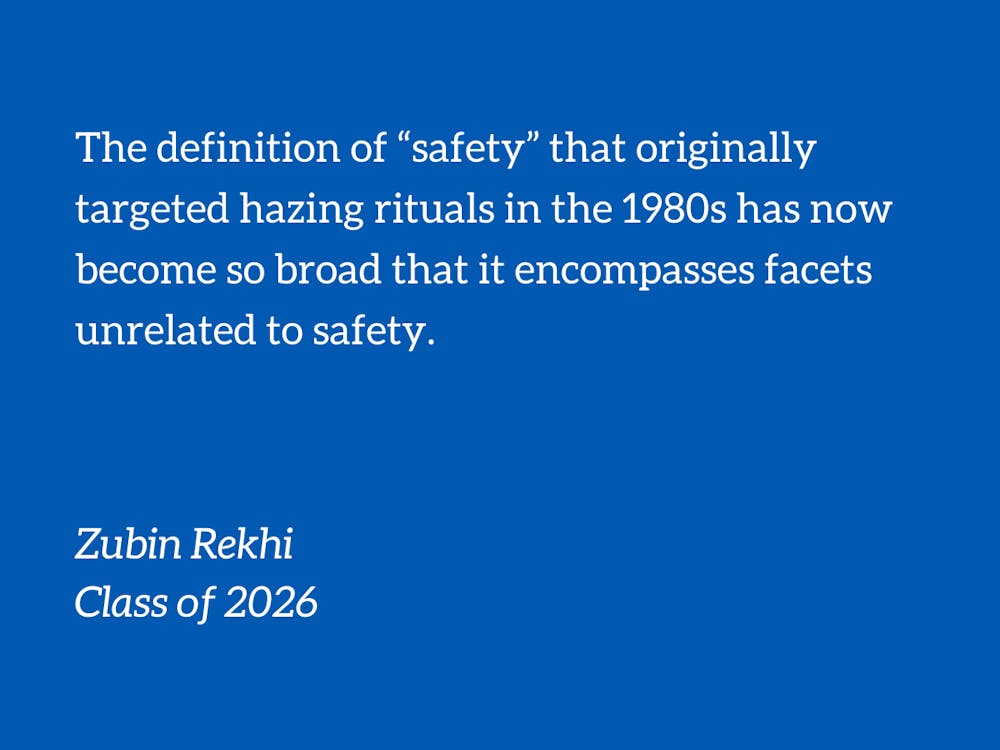An eye-opening New York Times article, written by a professor at neighboring UNC-Chapel Hill, Dr. Rita Koganzon, caught my attention last week. It describes how universities are increasingly extending a mix of carrots and sticks to control more aspects of student life. She explains that as part of the ever-expansive “facilitator model” that has taken hold, universities have reinstated control over student life, in which “It’s not that students don’t have rights; it’s just that safety comes first.” According to her, as universities began to expand and supersede a fixed definition of “safety,” they extended carrots — “relative generosity to their students” — to legitimize their enlarged presence.
I believe this dynamic is playing out at Duke. There are many previous articles in The Chronicle outlining how the university often infantilizes its student body by restricting their choices. There are others that detail how the university extends generosity to the student body — in some quarters, deserved, in others, not so much. I believe that generosity and control are two sides of the same coin, demonstrating an evolving social contract in which benefits experienced by the student body are, often implicitly, conditioned on further restrictions in other facets of student life.
This system offers students more benefits in certain quarters while restricting their autonomy in others.
Let’s start with the benefits. In the classroom, grade inflation, for example, has been extensively covered by The Chronicle. Students now take weed-out classes like Econ 101 and Public Policy 155 on a S/U, rather than graded, basis. Even for those classes that are graded, they are likely to get an A, without much legwork — the cutoff to be top 25% for last Spring’s juniors in Trinity was a 3.92 GPA and in Pratt was a 3.877. Outside the classroom, students enjoy performances on LDOC featuring Swae Lee and on Founder’s Day featuring Ed Sheeran on campus, some of the best student dining food in the country, freshly renovated (and costly) dorms in even our oldest buildings, rapid shuttle frequency to get us on and off campus with convenience between 6:30 AM and 12:30 PM and DukeVans to get us home at night at the touch of a button as late as 2:30 AM.
I want to acknowledge three caveats here. One, not all of this generosity is equally deserved — for example, I support DukeVans that enhance student safety, while opposing the more pernicious effects of grade inflation. Two, many of these benefits arose due to student advocacy — for example, to extend DukeVan service for student safety concerns — and not out of the beneficence of the administration. Three, many of these improvements exist amidst lingering concerns — for example, concerning dining affordability — and they’re not as universally or equitably enjoyed as I’d like. However, for the most part, Duke students have it pretty good in student life — at least better than many alumni or many of our parents can attest to when recounting their college experiences.
On the flip side, however, administration is more involved than ever in student life. With the establishment of the QuadEx system, Duke students now live on campus for three, and often all four years, in contrast to peer schools. In their first year, students are assigned random roommates and in their second, they must move in tandem with their first year Quad community to a West campus quad. As late as their sophomore year, students are inhibited from choosing roommates beyond their assigned quads, and as late as senior year, students regularly live on campus. When students want to study abroad, students face program caps for their desired destination if it, like Copenhagen or Madrid, is popular with the student body. Hungry students need not worry if they are allergic to nuts: there is no Panda Express with tempting late-night treats; no almond milk in campus coffee shops and no peanuts in my pad thai at Ginger & Soy.
In other words, the definition of “safety” that originally targeted hazing rituals in the 1980s has now become so broad that it encompasses facets unrelated to safety. As the university went from being a neutral facilitator, taking a hands-off approach to all student actions clearing the low bar of safety, to an active participant with veto power over student choices, it also used its expanded powers — in ways intentional or not — to extend benefits to students. The same administrators that forcefully inserted themselves in conversations about roommate selection, for example, renovated old West Campus dorms, giving them alluring living spaces, bathrooms and amenities. The same dining authorities that took away Panda Express and peanuts from WU also renovated it into a world-class, aesthetically pleasing facility serviced by an array of local vendors. And the same academic deans that made studying abroad in our desired programs harder also acquiesced to making school easier.
But college students are adults and we should make our choices, even in the midst of an evolving and enlarging university apparatus. I’m proud of the fact that my classmates have gone out of their way to reject this saccharine social contract that offers us benefits conditioned on increased control, demonstrating maturity in the face of infantilizing — but often lifestyle-enhancing — rules. I implore Duke administration to listen to my colleagues and treat them like adults — by listening to their calls for scaling back their control over student life.
Zubin Rekhi is a Trinity junior. His pieces typically run on alternate Fridays.
Get The Chronicle straight to your inbox
Sign up for our weekly newsletter. Cancel at any time.

